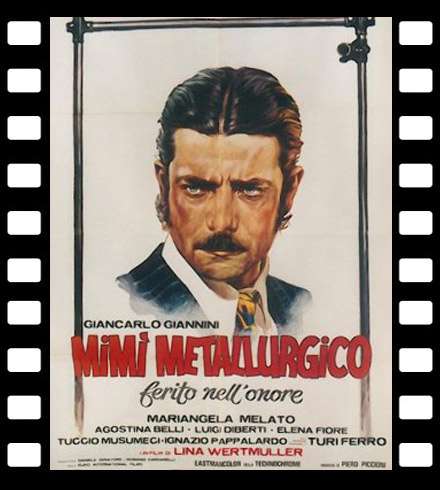Marcello is in the compartment of an Italian train, facing forward when the mineral water of the woman seated across from him starts to fall toward him. He catches the bottle and makes eye contact and follows her when she leaves the compartment. For a few moments she finds him attractive too. Then suddenly she gets off the train and starts walking through a field. Marcello follows her, loses her, finds himself in a large hotel surrounded by women. A feminist conference is taking place and he tries to escape.
Federico Fellini’s epic 1980 fantasia introduced the start of the Maestro’s delirious late period. A surrealist tour-de-force filmed on soundstages and locations alike, and overflowing with the same sensory (and sensual) invention heretofore found only in the classic movie-musicals (and Fellini’s own oeuvre), La città delle donne [City of Women] taps into the era’s restless youth-culture, coalescing into nothing less than Fellini’s post-punk opus.
Marcello Mastroianni appears as Fellini’s alter ego in a semi-reprise of his character from 8-1/2, Snàporaz. As though passing into a dream, the charismatic avatar finds himself initiated into a phantasmagoric world where women — or an idea of women — have taken power, and which is structured like an array of psychosexual set-pieces — culminating in a bravura hot-air balloon that decisively sticks the “anti” up into “climax”.
If ever there was a director whose appetites could barely be constrained by the big screen, it was Federico Fellini. See, many great films have been made about a director’s love for a woman, but that wasn’t enough for Fellini. Hence City Of Women, in which the maestro tries – and fails – to make a film about all of womankind.
It begins simply enough, with Marcello Mastroianni (playing Snàporaz, although really he’s the same charaecter Mastroianni always played for Fellini) catching sight of a lady and deciding he wants some. Yet it’s not long before she’s led him through the looking glass into a world where the concept of an ideal woman splinters into shards and reflections, all as ungraspable and unattainable as she is.
The intention is symbolic, with Fellini making a tempestuous, ironic confessional. This is the work of a guy who loves and fears women, who worships them but admits that the idea of worship contains as much lechery and condescension as praise or respect. In other words, it’s a staunch diatribe against misogyny that can’t help but come across as misogynistic. While the failings of Fellini’s on-screen alter ego are set against a parade of seductresses, feminists, butch predators and drugged up lesbians, in contrast, Mastroianni remains the height of louche European sophistication.
The messiness of the philosophy is heightened by the messiness of the film’s construction. There’s a reason why some directors’ styles become an adjective, and by 1980 Fellini was all too aware of being Fellini-esque. The result is a teeming burlesque of frantic movement and jabbering talk, exhilarating in small doses but exhausting after 140 minutes.
Sure, there are brilliant set-pieces, notably Mastroianni walking through a lothario’s home and finding a mausoleum to his host’s many sexual conquests – whole corridors decked out in portraits of his lovers that are accompanied by an optional soundtrack of their sexual deeds. It’s testament to the production design of Dante Ferreti and the cinematography of Giuseppe Rotunno that this sequence is so complex: witty, surreal and disconcerting. In itself, it’s a savage indictment of bedpost-notch chauvinism, but it sits oddly in the middle of a film whose supporting cast of buxom beauties and hard-faced harridians serves as a cinematic version of Hot or Not?
Elsewhere, militant feminists don rollerskates, light fittings have tongues, a guy who looks like a fat Keith Lemon pisses on a giant birthday cake, and Mastroianni gets stuck on a fairground slide taking him on a flashback through his past crushes. All of this sounds like it would be pretty amazing to watch… and it is, sort of. Yet all the imagination has gone into the details, and none whatsoever into their conceptual underpinning.
It’s tempting to assume that Fellini simply can’t decide what kind of film this is and has opted to create an exercise in wilful WTF-ery to mask his indecision. Sure enough, at one point Mastroianni (who incidentally looks absolutely flummoxed by his surroundings, as well he might) gives up and joins the audience in wondering, “What kind of film is this?” Yet the answer is surely there on the screen. Essentially, after two and a half hours, all Fellini has concluded is that men are crazy to be crazy about women when women are so crazy, too. The problem is that you can easily imagine Mastroianni saying exactly that – a lift of his sunglasses, a quizzically raised brow, a disdainful shrug – in a heartbeat. The rest is noise.
©Simon Kinnear
http://nitroflare.com/view/558FE49DF85E310/La_Citt%C3%A0_Delle_Donne.mkv
http://uploadgig.com/file/download/44089b54cEc28c95/La Città Delle Donne.mkv
Language(s):Italian
Subtitles:English










































































































































































